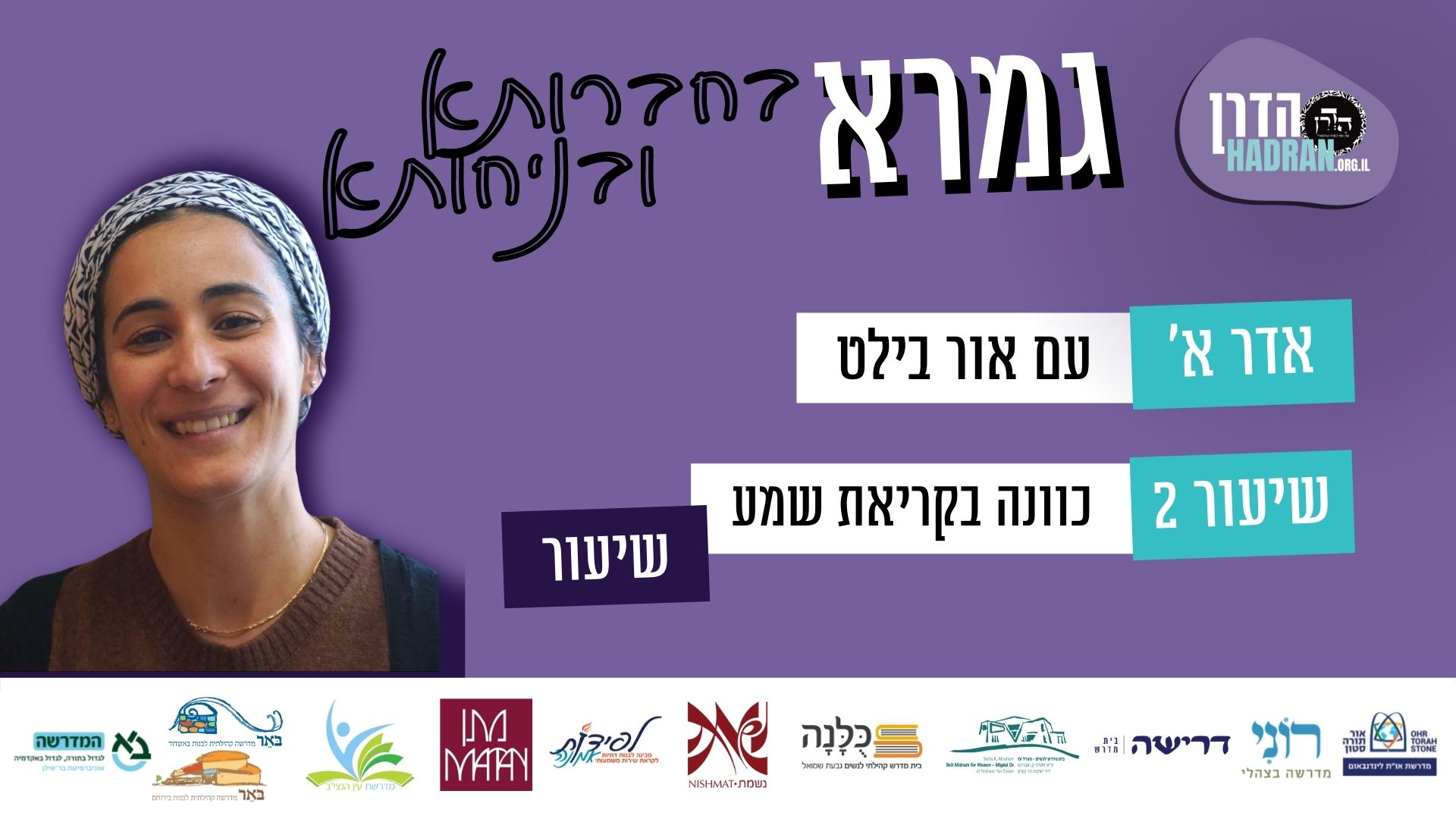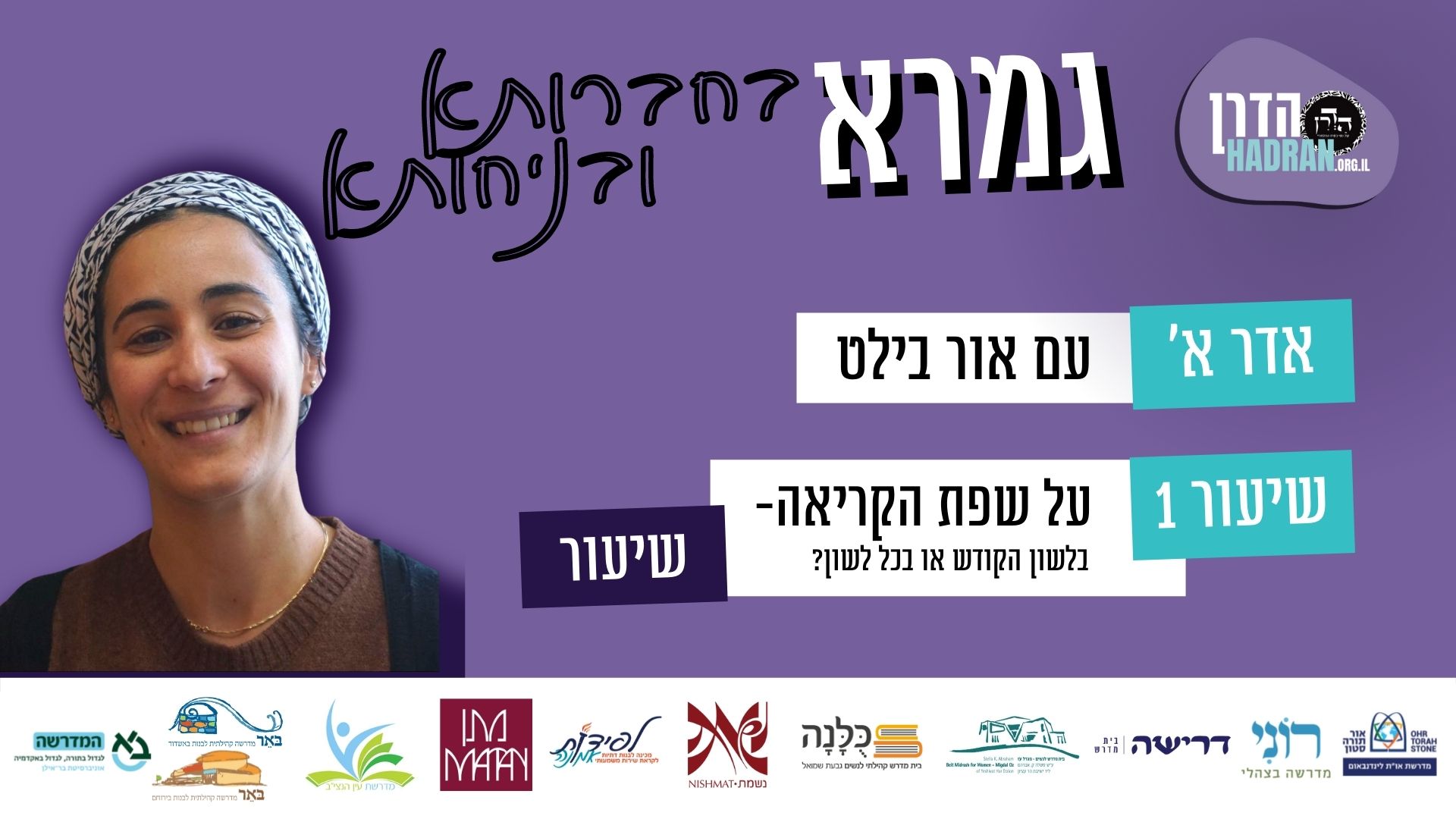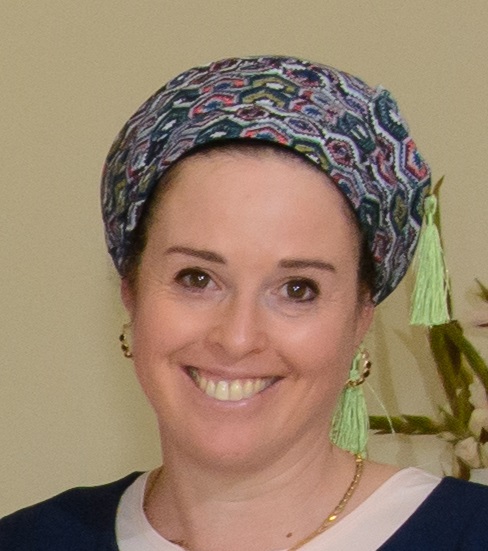חכמים ור’ יהודה חולקים במשנה על מה מברכים אם יש הרבה מינים – על שבעת המינים או על מה שחביב? באיזה מקרה חולקים – כשיש דברים מאותו סוג ברכה או גם כשיש שני סוגים שונים? אם בירך על ירק בורא פרי האדמה והיה גם פרי העץ בפניו, האם יצא ידי חובת פרי העץ מברכת בורא פרי האדמה? דין קדימה ברכות לומדים מהפסוק "ארץ חטה ושעורה וגפן…” או אולי דורשים מפסוק זה שיעורים שונים שקבעו חכמים בדינים שונים. איך בדיוק הסדר לפי הפסוק "ארץ חיטה…” – האם זה לפי הסדר או לפי מה הכי קרובה למילה "ארץ” שמופיע פעמיים בפסוק? אם מביאים פירות וקינוח, האם מברכים ברכה ראשונה ואחרונה בנפרד? האם פת פוטר כל מאכל ויין פוטר כל משקה? למה "המוציא” לא פוטר גם יין?
רוצה להקדיש שיעור?
כלים
העמקה
רוצה להבין מה באמת קורה מתחת לפני השטח של הסוגיה?
שיעורים, פודקאסטים והרחבות של מיטב המורות שלנו יפתחו לך עוד זוויות וכיווני חשיבה.
חדשה בלימוד הגמרא?
זה הדף הראשון שלך? איזו התרגשות עצומה! יש לנו בדיוק את התכנים והכלים שיעזרו לך לעשות את הצעדים הראשונים ללמידה בקצב וברמה שלך, כך תוכלי להרגיש בנוח גם בתוך הסוגיות המורכבות ומאתגרות.
פסיפס הלומדות שלנו
גלי את קהילת הלומדות שלנו, מגוון נשים, רקעים וסיפורים. כולן חלק מתנועה ומסע מרגש ועוצמתי.
ברכות מא
בִּשְׁלָמָא לְמַאן דְּאָמַר תַּמְרֵי דְזִיקָא, הַיְינוּ דְּהָכָא קָרֵי לַהּ ״נוֹבְלוֹת״ סְתָמָא, וְהָתָם קָרֵי לַהּ ״תְּמָרָה״, אֶלָּא לְמַאן דְּאָמַר בּוּשְׁלֵי כַמְרָא, נִיתְנֵי אִידֵּי וְאִידֵּי ״נוֹבְלוֹת תְּמָרָה״, אוֹ אִידֵּי וְאִידֵּי ״נוֹבְלוֹת״ סְתָמָא. קַשְׁיָא.
Granted, according to the one who said that novelot temara are dates felled by the wind, that is why here, when our mishna speaks of ruined dates, it calls them novelot, unmodified and there, when it speaks of those that fell because of the wind, it calls them novelot temara. However, according to the one who said that novelot temara are dates burned by the heat of the sun, it should have taught in this mishna here and that, the mishna in tractate Demai, novelot temara; or taught in this and that novelot, unmodified. The use of different terms indicates that the mishnayot are discussing different items. No answer was found to this question, and the Gemara notes that indeed, according to the one who said that novelot temara are dates burned by the heat of the sun, it is difficult.
הָיוּ לְפָנָיו מִינִין הַרְבֵּה וְכוּ׳. אָמַר עוּלָּא: מַחֲלוֹקֶת בְּשֶׁבִּרְכוֹתֵיהֶן שָׁווֹת, דְּרַבִּי יְהוּדָה סָבַר מִין שִׁבְעָה עָדִיף, וְרַבָּנַן סָבְרִי מִין חָבִיב עָדִיף. אֲבָל בְּשֶׁאֵין בִּרְכוֹתֵיהֶן שָׁווֹת — דִּבְרֵי הַכֹּל מְבָרֵךְ עַל זֶה, וְחוֹזֵר וּמְבָרֵךְ עַל זֶה.
The mishna cited a dispute with regard to the order in which one is supposed to recite the blessings when there were many types of food before him. Rabbi Yehuda says: If there is one of the seven species for which Eretz Yisrael was praised among them, he recites the first blessing over it. And the Rabbis say: He recites a blessing over whichever of them he wants. Ulla said: This dispute is specifically in a case where the blessings to be recited over each type of food are the same, as in that case Rabbi Yehuda holds: The type of the seven species takes precedence, and the Rabbis hold: The preferred type takes precedence, and a blessing is recited over it first. However, when their blessings are not the same, everyone agrees that one must recite a blessing over this type of food and then recite another blessing over that, ensuring that the appropriate blessing is recited over each type of food.
מֵיתִיבִי: הָיוּ לְפָנָיו צְנוֹן וְזַיִת — מְבָרֵךְ עַל הַצְּנוֹן וּפוֹטֵר אֶת הַזַּיִת! הָכָא בְּמַאי עָסְקִינַן — כְּשֶׁהַצְּנוֹן עִקָּר.
The Gemara raises an objection to this based on what was taught in a baraita: If a radish and an olive were before him, he recites a blessing over the radish and exempts the olive from the requirement of a blessing, although their blessings are different. The Gemara answers: With what are we dealing here? With a case where the radish is the primary component for the one partaking of them, and the olive serves only to temper the taste of the radish. Therefore, he need recite a blessing only over the radish.
אִי הָכִי, אֵימָא סֵיפָא: רַבִּי יְהוּדָה אוֹמֵר מְבָרֵךְ עַל הַזַּיִת, שֶׁהַזַּיִת מִמִּין שִׁבְעָה. לֵית לֵיהּ לְרַבִּי יְהוּדָה, הָא דִּתְנַן: כׇּל שֶׁהוּא עִיקָּר וְעִמּוֹ טְפֵלָה — מְבָרֵךְ עַל הָעִיקָּר וּפוֹטֵר אֶת הַטְּפֵלָה? וְכִי תֵּימָא: הָכִי נָמֵי דְּלֵית לֵיהּ, וְהָתַנְיָא: רַבִּי יְהוּדָה אוֹמֵר: אִם מֵחֲמַת צְנוֹן בָּא הַזַּיִת — מְבָרֵךְ עַל הַצְּנוֹן וּפוֹטֵר אֶת הַזַּיִת.
The Gemara continues and asks: If so, say the latter clause of the baraita where Rabbi Yehuda says: One recites a blessing over the olive, as the olive is a type of the seven species. Does Rabbi Yehuda not accept that principle which we learned in a mishna: Any food that is primary, and is eaten with food that is secondary, one recites a blessing over the primary food, and that blessing exempts the secondary from the requirement to recite a blessing before eating it? And if you say: Indeed, he does not hold that the primary food exempts the secondary, wasn’t it taught in a baraita: Rabbi Yehuda says: If it is due to the radish that the olive comes, one recites a blessing over the radish and exempts the olive. If so, the dispute whether to recite a blessing over the radish or the olive must be in a case where the radish is not primary. This is an apparent contradiction of Ulla’s statement.
לְעוֹלָם בִּצְנוֹן עִיקָּר עָסְקִינַן, וְכִי פְּלִיגִי רַבִּי יְהוּדָה וְרַבָּנַן — בְּמִילְּתָא אַחֲרִיתִי פְּלִיגִי, וְחַסּוֹרֵי מְחַסְּרָא, וְהָכִי קָתָנֵי: הָיוּ לְפָנָיו צְנוֹן וְזַיִת — מְבָרֵךְ עַל הַצְּנוֹן וּפוֹטֵר אֶת הַזַּיִת. בַּמֶּה דְּבָרִים אֲמוּרִים — כְּשֶׁהַצְּנוֹן עִיקָּר, אֲבָל אֵין הַצְּנוֹן עִיקָּר — דִּבְרֵי הַכֹּל מְבָרֵךְ עַל זֶה וְחוֹזֵר וּמְבָרֵךְ עַל זֶה. וּשְׁנֵי מִינִין בְּעָלְמָא שֶׁבִּרְכוֹתֵיהֶן שָׁווֹת — מְבָרֵךְ עַל אֵיזֶה מֵהֶן שֶׁיִּרְצֶה. רַבִּי יְהוּדָה אוֹמֵר: מְבָרֵךְ עַל הַזַּיִת, שֶׁהַזַּיִת מִמִּין שִׁבְעָה.
The Gemara responds: Actually, we are dealing with a case where the radish is the primary component of the meal, and when Rabbi Yehuda and the Rabbis disagree, it is with regard to a different case that they disagree, and this baraita is incomplete and it teaches the following: If a radish and an olive were before him, he recites a blessing over the radish and exempts the olive. In what circumstances does this apply? Specifically when the radish is primary, but when the radish is not primary, everyone agrees that one recites the appropriate blessing over this one and then he again recites the appropriate blessing over that one. However, in general, if two types of food whose blessings are identical were before him, he recites a blessing over whichever of them that he wants. Rabbi Yehuda says: He recites a blessing over the olive, as the olive is a type of the seven species.
פְּלִיגִי בַּהּ רַבִּי אַמֵּי וְרַבִּי יִצְחָק נַפָּחָא. חַד אָמַר: מַחֲלוֹקֶת בְּשֶׁבִּרְכוֹתֵיהֶן שָׁווֹת, דְּרַבִּי יְהוּדָה סָבַר מִין שִׁבְעָה עָדִיף, וְרַבָּנַן סָבְרִי מִין חָבִיב עָדִיף. אֲבָל בְּשֶׁאֵין בִּרְכוֹתֵיהֶן שָׁווֹת — דִּבְרֵי הַכֹּל מְבָרֵךְ עַל זֶה וְחוֹזֵר וּמְבָרֵךְ עַל זֶה. וְחַד אָמַר: אַף בְּשֶׁאֵין בִּרְכוֹתֵיהֶן שָׁווֹת נָמֵי מַחֲלוֹקֶת.
Rabbi Ami and Rabbi Yitzḥak Nappaḥa disagreed with regard to this subject. One said: The dispute is in a case where their blessings are identical, as Rabbi Yehuda held: A type of the seven species takes precedence and the blessing is recited over it first. And the Rabbis held: The preferred type takes precedence, and a blessing is recited over it first; however, when their blessings are not identical, everyone agrees that one recites the appropriate blessing over this one and then he again recites the appropriate blessing over that one. And one said: Even when their blessings are not identical, there is also a dispute.
בִּשְׁלָמָא לְמַאן דְּאָמַר בְּשֶׁבִּרְכוֹתֵיהֶן שָׁווֹת מַחֲלוֹקֶת — שַׁפִּיר, אֶלָּא לְמַאן דְּאָמַר בְּשֶׁאֵין בִּרְכוֹתֵיהֶן שָׁווֹת פְּלִיגִי, בְּמַאי פְּלִיגִי! אָמַר רַבִּי יִרְמְיָה: לְהַקְדִּים.
The Gemara discusses this: Granted, according to the one who said that the dispute is in a case where their blessings are identical, it works out well. However, according to the one who says that they disagree in a case where their blessings are not identical, then about what do they disagree? One must recite two blessings in any case. Rabbi Yirmeya said: They disagree with regard to which blessing precedes the other.
דְּאָמַר רַב יוֹסֵף וְאִיתֵּימָא רַבִּי יִצְחָק: כׇּל הַמּוּקְדָּם בְּפָסוּק זֶה, מוּקְדָּם לִבְרָכָה, שֶׁנֶּאֱמַר: ״אֶרֶץ חִטָּה וּשְׂעֹרָה וְגֶפֶן וּתְאֵנָה וְרִמּוֹן אֶרֶץ זֵית שֶׁמֶן וּדְבָשׁ״.
As Rav Yosef, and some say Rabbi Yitzḥak, said: Each food whose significance is manifest in that it precedes the others in this verse, which sings the praises of Eretz Yisrael, takes precedence over the others in terms of blessing as well, as it is stated: “A land of wheat and barley, vines, figs and pomegranates, a land of olive oil and honey” (Deuteronomy 8:8).
וּפְלִיגָא דְּרַבִּי חָנָן. דְּאָמַר רַבִּי חָנָן: כׇּל הַפָּסוּק כּוּלּוֹ לְשִׁיעוּרִין נֶאֱמַר.
The Gemara notes: And this opinion disagrees with the opinion of Rabbi Ḥanan. As Rabbi Ḥanan said: The entire verse was stated for the purpose of teaching measures with regard to different halakhot in the Torah.
״חִטָּה״, דִּתְנַן: הַנִּכְנָס לַבַּיִת הַמְנוּגָּע, וְכֵלָיו עַל כְּתֵפָיו, וְסַנְדָּלָיו וְטַבְּעוֹתָיו בְּיָדָיו — הוּא וָהֵן טְמֵאִין מִיָּד. הָיָה לָבוּשׁ כֵּלָיו, וְסַנְדָּלָיו בְּרַגְלָיו, וְטַבְּעוֹתָיו בְּאֶצְבְּעוֹתָיו — הוּא טָמֵא מִיָּד, וְהֵן טְהוֹרִין עַד שֶׁיִּשְׁהֶא בִּכְדֵי אֲכִילַת פְּרָס. פַּת חִטִּין וְלֹא פַּת שְׂעוֹרִין, מֵיסֵב וְאוֹכְלָן בְּלִפְתָּן.
Wheat was mentioned as the basis for calculating the time required for one to become ritually impure by entering a house afflicted with leprosy, as we learned in a mishna: One who enters a house afflicted with leprosy of the house (see Leviticus 14:33–53) with his clothes resting on his shoulders, and his sandals and his rings are in his hands, both he and they, the clothes, sandals, and rings, immediately become ritually impure. However, if he was dressed in his clothes, and his sandals were on his feet and his rings on his fingers, he immediately becomes ritually impure upon entering the house, but they, the clothes, sandals, and rings, remain pure until he stays in the house long enough to eat half a loaf of bread. This calculation is made with wheat bread, which takes less time to eat, and not with barley bread, and with one who is reclining and eating the bread with a relish, which hastens the eating. There is, then, a Torah measurement that is connected specifically to wheat.
״שְׂעֹרָה״, דִּתְנַן: עֶצֶם כִּשְׂעוֹרָה מְטַמֵּא בְּמַגָּע וּבְמַשָּׂא, וְאֵינוֹ מְטַמֵּא בְּאֹהֶל.
Barley is also used as the basis for a measure, as we learned in a mishna: A bone from a corpse that is the size of a grain of barley imparts ritual impurity through contact and by being carried, but it does not impart impurity by means of a tent, i.e., if the bone was inside a house, it does not defile all of the articles in the house.
״גֶּפֶן״, כְּדֵי רְבִיעִית יַיִן לְנָזִיר. ״תְּאֵנָה״, כִּגְרוֹגֶרֶת לְהוֹצָאַת שַׁבָּת. ״רִמּוֹן״, כְּדִתְנַן: כׇּל כְּלֵי בַּעֲלֵי בָתִּים
The halakhic measure determined by vines is the quantity of a quarter log of wine for a Nazirite and not the wine equivalent of a quarter log of water, which is a slightly different measure. Figs serve as the basis for the measure of a dried fig-bulk, typically the smallest unit of food for which someone will be held liable for carrying out on Shabbat from one domain to another. Pomegranates teach us a particular measurement as well, as we learned in a mishna: All ritually impure wooden utensils belonging to ordinary homeowners become pure through breaking the utensil,
שִׁיעוּרָן כְּרִמּוֹנִים.
as an impure vessel loses its status as a vessel and consequently its impurity when it can no longer be used, if they have holes the size of pomegranates.
״אֶרֶץ זֵית שֶׁמֶן״, אָמַר רַבִּי יוֹסֵי בְּרַבִּי חֲנִינָא: אֶרֶץ שֶׁכָּל שִׁיעוּרֶיהָ כְּזֵיתִים. כׇּל שִׁיעוּרֶיהָ סָלְקָא דַּעְתָּךְ?! וְהָא אִיכָּא הָנָךְ דַּאֲמַרַן! אֶלָּא אֶרֶץ שֶׁרוֹב שִׁיעוּרֶיהָ כְּזֵיתִים.
A land of olive oil: Rabbi Yosei, son of Rabbi Ḥanina, said that the verse should be expounded as follows: A land, all of whose measures are the size of olives. The Gemara poses a question: Can it enter your mind that it is a land all of whose measures are the size of olives? Aren’t there those measures that we mentioned above, which are not the size of olives? Rather, say: A land, most of whose measures are the size of olives, as most of the measures relating to forbidden foods and other matters are the size of olives.
״דְּבָשׁ״, כְּכוֹתֶבֶת הַגַּסָּה בְּיוֹם הַכִּפּוּרִים. וְאִידָךְ — הָנֵי שִׁיעוּרִין בְּהֶדְיָא מִי כְּתִיבִי? אֶלָּא מִדְּרַבָּנַן, וּקְרָא אַסְמַכְתָּא בְּעָלְמָא.
Honey, i.e., dates from which date honey is extracted, also alludes to a measurement. With regard to Yom Kippur, one is only liable if he eats the equivalent of a large date on Yom Kippur. The Gemara asks: And what will the other amora, who interpreted the verse as referring to the halakhot of precedence in blessings, say with regard to this midrash? The Gemara responds: Are these measures written explicitly in the Torah? Rather, they are by rabbinic law, and the verse is a mere support, an allusion to these measures.
רַב חִסְדָּא וְרַב הַמְנוּנָא הֲווֹ יָתְבִי בִּסְעוֹדְתָּא. אַיְיתוֹ לְקַמַּיְיהוּ תַּמְרֵי וְרִמּוֹנֵי. שְׁקַל רַב הַמְנוּנָא, בָּרֵיךְ אַתַּמְרֵי בְּרֵישָׁא. אֲמַר לֵיהּ רַב חִסְדָּא: לָא סָבַר לַהּ מָר לְהָא דְּאָמַר רַב יוֹסֵף, וְאִיתֵּימָא רַבִּי יִצְחָק: כׇּל הַמּוּקְדָּם בְּפָסוּק זֶה קוֹדֵם לִבְרָכָה?
With regard to the halakhot of precedence in blessings, the Gemara relates: Rav Ḥisda and Rav Hamnuna were sitting at a meal. They brought dates and pomegranates before them. Rav Hamnuna took and recited a blessing over the dates first. Rav Ḥisda said to him: Does the Master not hold that halakha which Rav Yosef, and some say Rabbi Yitzḥak, said: Each food that precedes the others in this verse, precedes the others in terms of blessing as well? The pomegranate precedes the date in that verse.
אֲמַר לֵיהּ: זֶה שֵׁנִי לְ״אֶרֶץ״, וְזֶה חֲמִישִׁי לְ״אֶרֶץ״. אֲמַר לֵיהּ: מַאן יָהֵיב לַן נִגְרֵי דְפַרְזְלָא וּנְשַׁמְּעִינָּךְ.
Rav Hamnuna said to him: This, the date, is mentioned second to the word land, in the verse: “A land of olive oil and honey,” just after the olive, and this, the pomegranate, is fifth to the word land. Rav Ḥisda said to him admiringly: Who will give us iron legs that we may serve you and constantly hear from you novel ideas.
אִיתְּמַר: הֵבִיאוּ לִפְנֵיהֶם תְּאֵנִים וַעֲנָבִים בְּתוֹךְ הַסְּעוּדָה, אָמַר רַב הוּנָא: טְעוּנִים בְּרָכָה לִפְנֵיהֶם וְאֵין טְעוּנִים בְּרָכָה לְאַחֲרֵיהֶם. וְכֵן אָמַר רַב נַחְמָן: טְעוּנִים בְּרָכָה לִפְנֵיהֶם וְאֵין טְעוּנִים בְּרָכָה לְאַחֲרֵיהֶם. וְרַב שֵׁשֶׁת אָמַר: טְעוּנִין בְּרָכָה בֵּין לִפְנֵיהֶם בֵּין לְאַחֲרֵיהֶם. שֶׁאֵין לְךָ דָּבָר שֶׁטָּעוּן בְּרָכָה לְפָנָיו וְאֵין טָעוּן בְּרָכָה לְאַחֲרָיו אֶלָּא פַּת הַבָּאָה בְּכִסָנִין בִּלְבַד. וּפְלִיגָא דְּרַבִּי חִיָּיא דְּאָמַר רַבִּי חִיָּיא: פַּת פּוֹטֶרֶת כׇּל מִינֵי מַאֲכָל, וְיַיִן פּוֹטֵר כׇּל מִינֵי מַשְׁקִים.
It was stated: If they brought figs and grapes before them during a meal, what blessings need to be recited? Rav Huna said: They require a blessing before eating them, and do not require a blessing after eating them, as Grace after Meals exempts them. And so too, Rav Naḥman said: They require a blessing before eating them, and do not require a blessing after eating them. And Rav Sheshet said: They require a blessing both before eating them and after eating them, even if he ate them during the meal, as you have nothing which requires a blessing before eating it and does not require a blessing after eating it, because it is exempted by Grace after Meals, except bread, a sweetened and spiced pastry, that comes as dessert, as it, too, is a type of bread. The statements of both Rav Huna and Rav Sheshet disagree with the opinion of Rabbi Ḥiyya, as Rabbi Ḥiyya said: Bread exempts all the types of food that one eats after it, and wine exempts all types of drinks that one drinks after it, and one need not recite a blessing either before or after eating them.
אָמַר רַב פָּפָּא: הִלְכְתָא דְּבָרִים הַבָּאִים מֵחֲמַת הַסְּעוּדָה בְּתוֹךְ הַסְּעוּדָה — אֵין טְעוּנִים בְּרָכָה לֹא לִפְנֵיהֶם וְלֹא לְאַחֲרֵיהֶם. וְשֶׁלֹּא מֵחֲמַת הַסְּעוּדָה בְּתוֹךְ הַסְּעוּדָה — טְעוּנִים בְּרָכָה לִפְנֵיהֶם וְאֵין טְעוּנִים בְּרָכָה לְאַחֲרֵיהֶם. לְאַחַר הַסְּעוּדָה — טְעוּנִים בְּרָכָה בֵּין לִפְנֵיהֶם בֵּין לְאַחֲרֵיהֶם.
Summarizing, Rav Pappa said that the halakha is: Food items that come due to the meal, which are eaten together with the bread as part of the meal, during the meal, neither require a blessing before eating them nor after eating them, as they are considered secondary to the bread. And food items like fruit, that do not come due to the meal, as part of the meal, but may be brought during the meal, require a blessing before eating them and do not require a blessing after eating them. If they come after the meal, they require a blessing both before eating them and after eating them.
שָׁאֲלוּ אֶת בֶּן זוֹמָא: מִפְּנֵי מָה אָמְרוּ דְּבָרִים הַבָּאִים מֵחֲמַת הַסְּעוּדָה בְּתוֹךְ הַסְּעוּדָה אֵינָם טְעוּנִים בְּרָכָה לֹא לִפְנֵיהֶם וְלֹא לְאַחֲרֵיהֶם? אָמַר לָהֶם: הוֹאִיל וּפַת פּוֹטַרְתָּן. אִי הָכִי, יַיִן נָמֵי נִפְטְרֵיהּ פַּת! שָׁאנֵי יַיִן
The Gemara relates that the students asked Ben Zoma: Why did the Sages say that food items that come due to the meal during the meal, neither require a blessing before eating them nor after eating them? He said to them: Because bread exempts them. They asked: If so, bread should also exempt wine. Yet, one recites a blessing over wine during the meal. The Gemara responds: Wine is different,



























